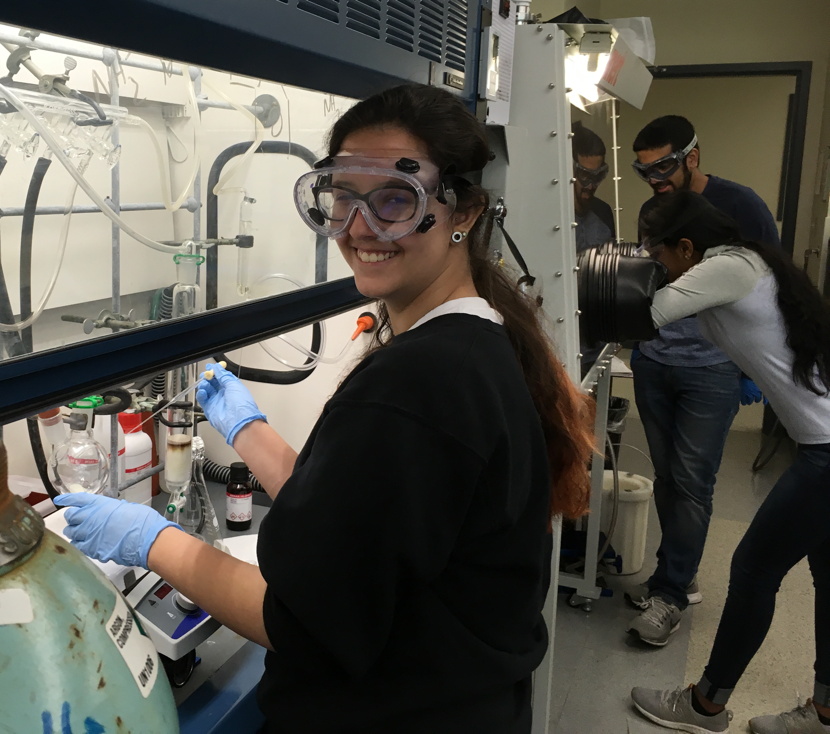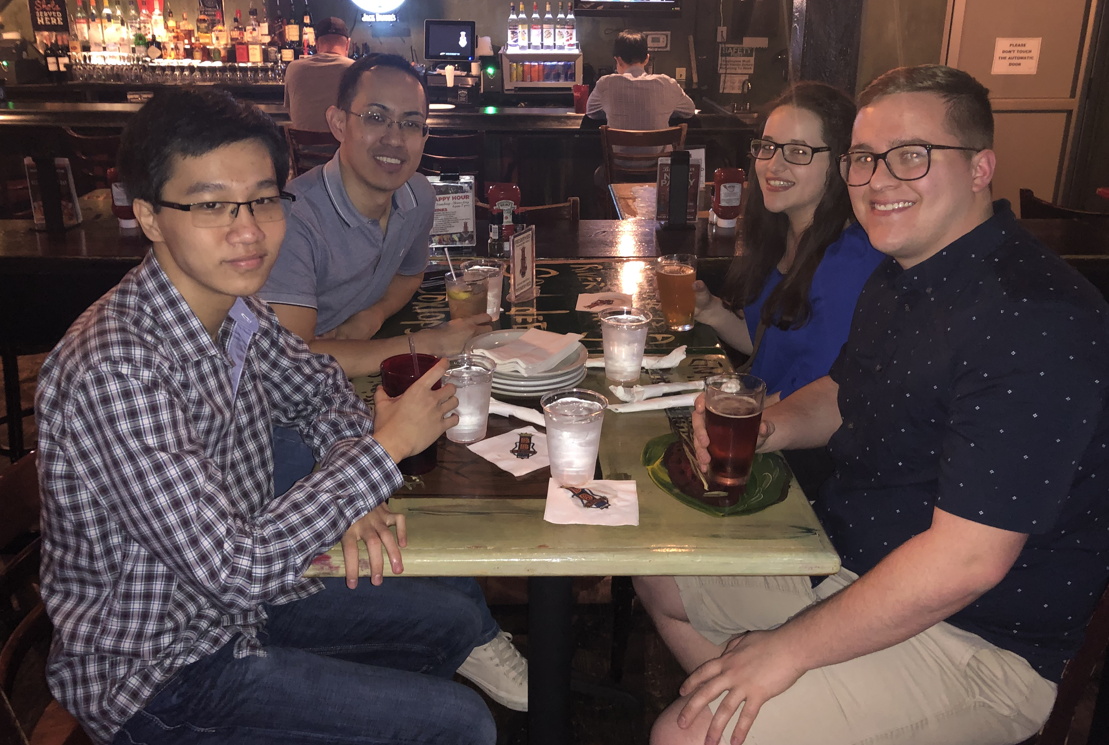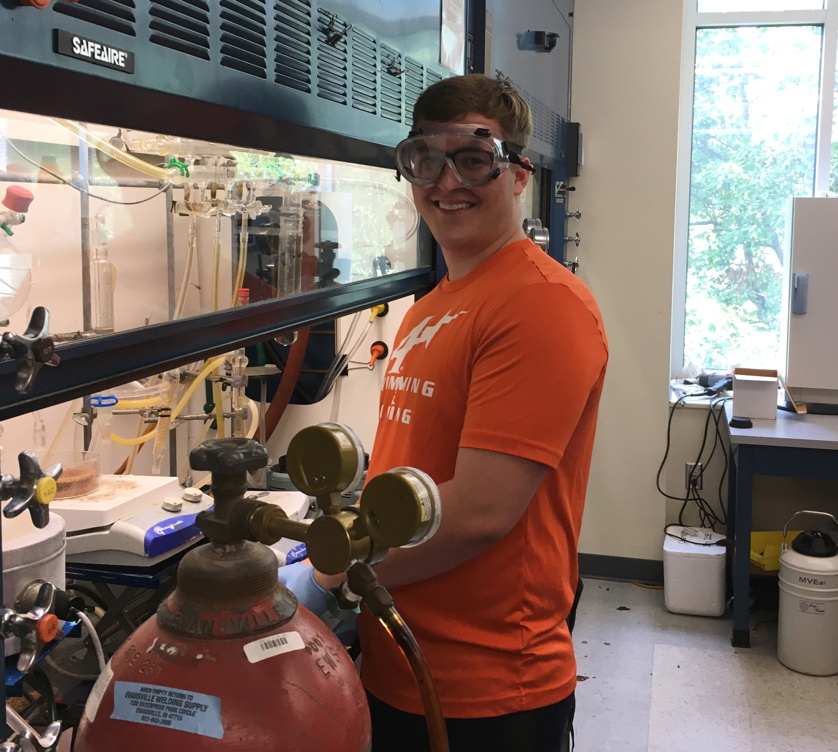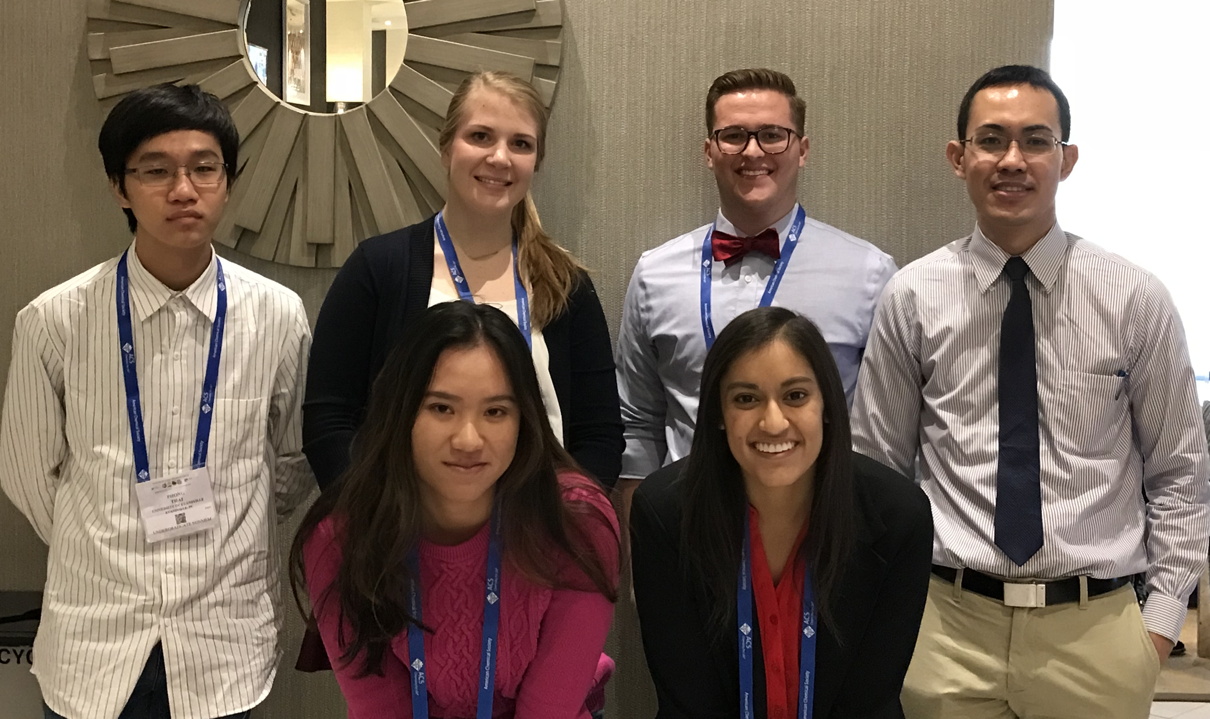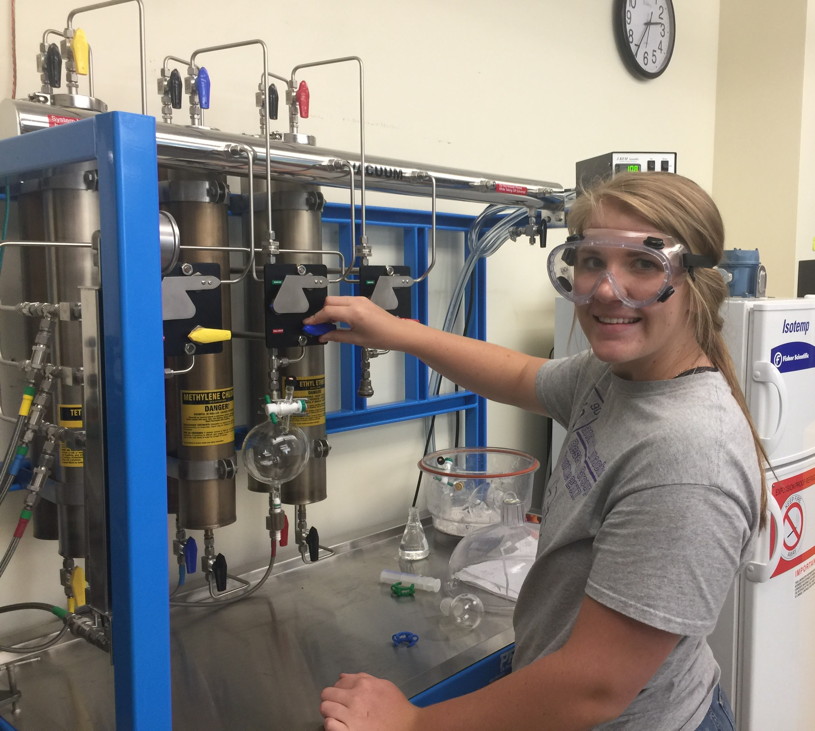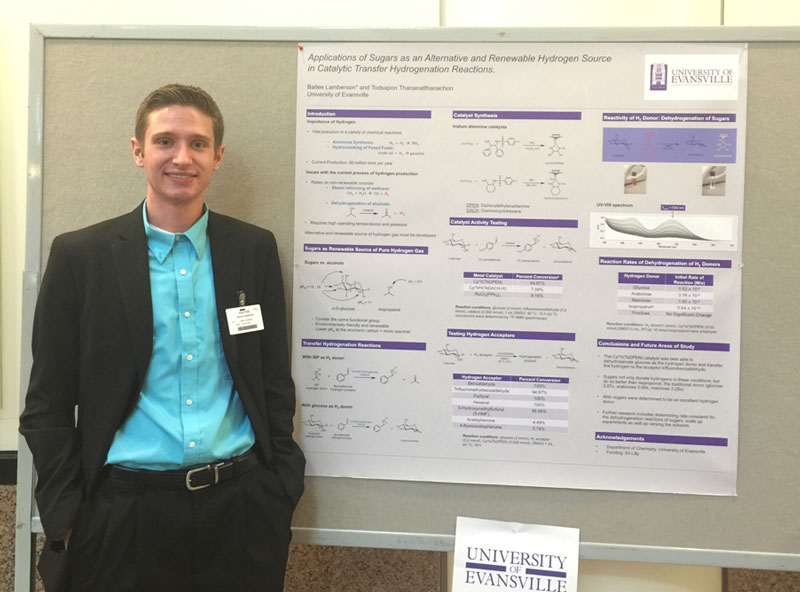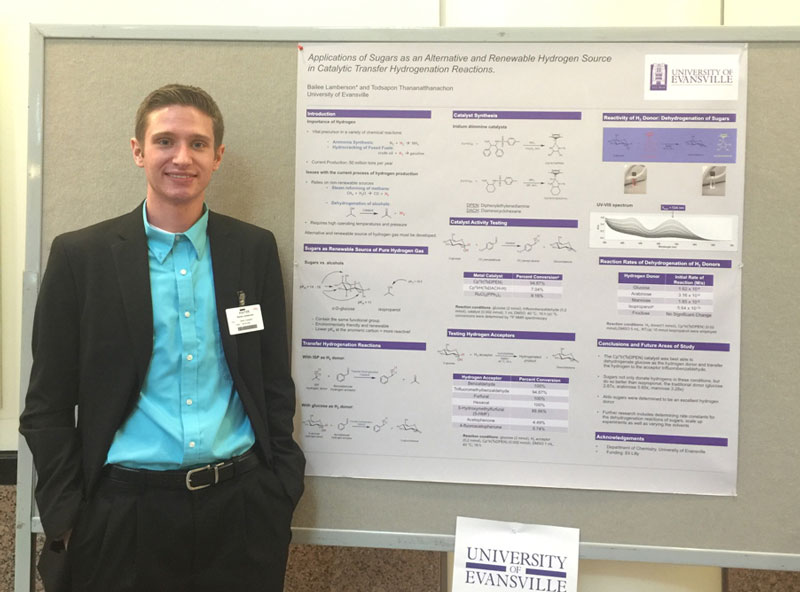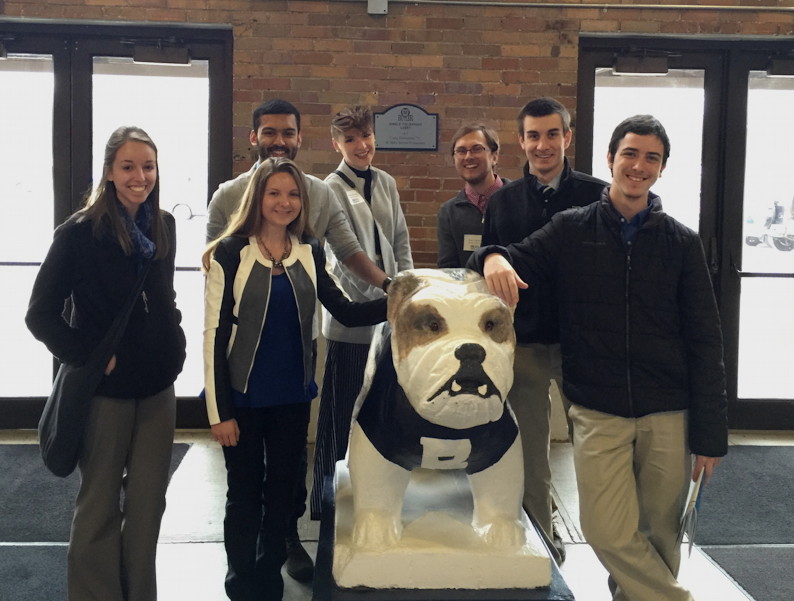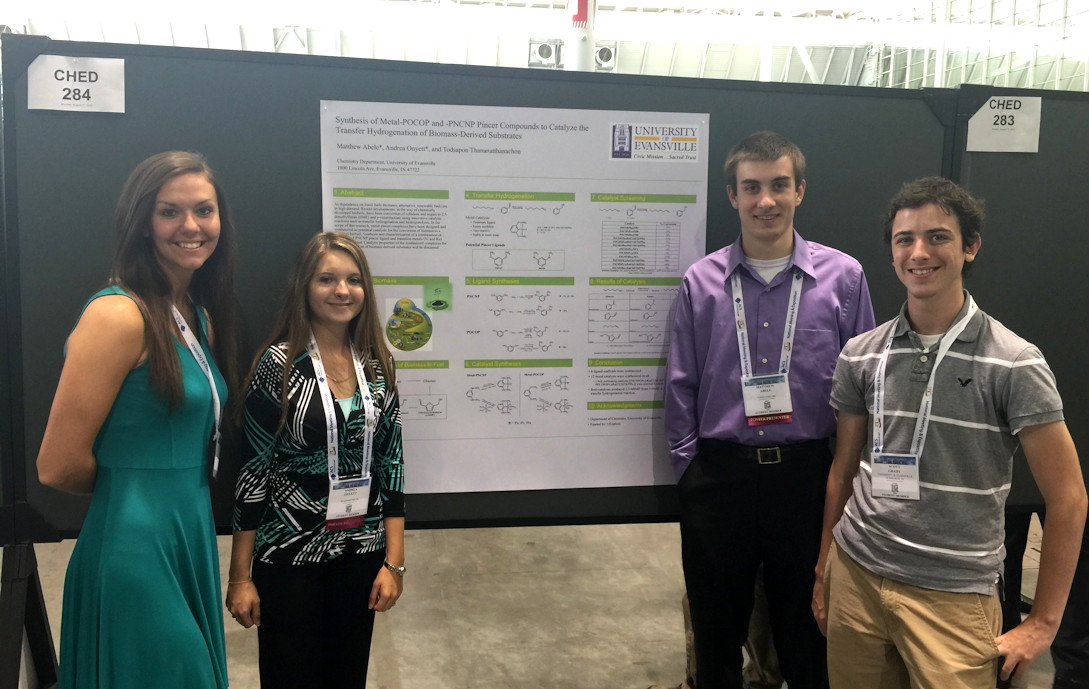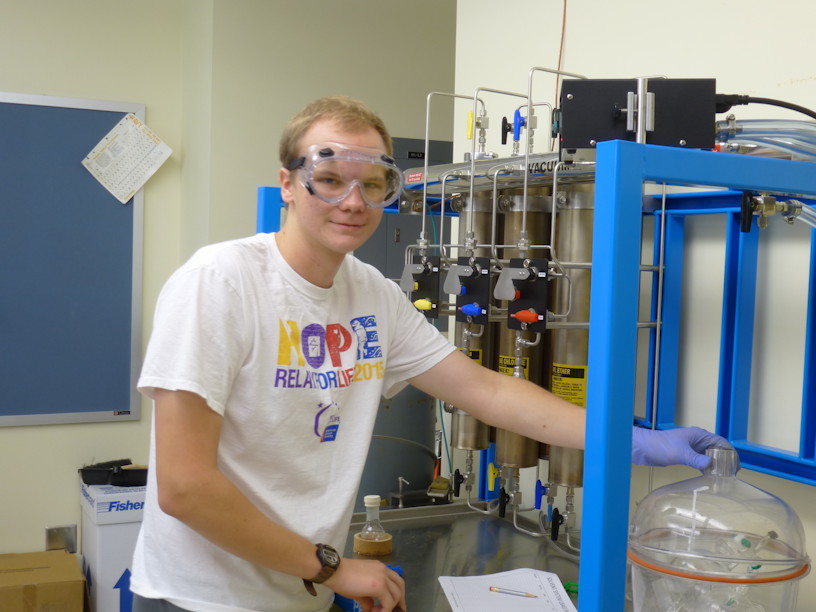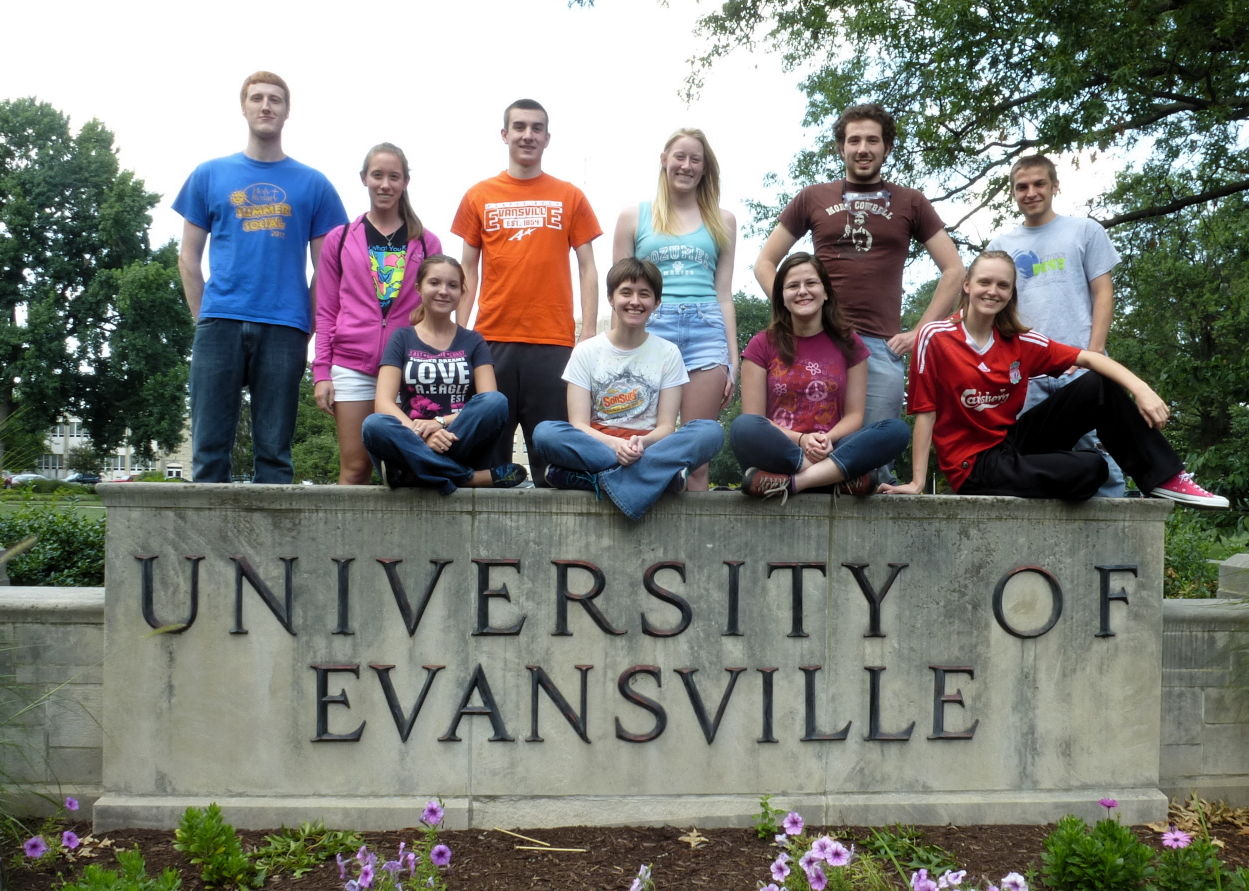Undergraduate Research
Nicholas Takebayashi
Hear senior Nicholas Takebayashi talk about the research opportunities he has had during his time at UE.
All chemistry and biochemistry students have the opportunity to participate in undergraduate research projects. Normally students will work with a faculty member in the department on a project of mutual interest. Funding for research can be provided by the University's UExplore Undergraduate Research Program. The Chemistry Department also provides funds through the Eli Lilly Undergraduate Research Grant and generous gifts from department alumni. Presently the stipend for 10 weeks of summer research is $3,500 with free on-campus housing.
To apply for departmental funds for summer research, please download and complete the linked application form and hand it in to the Department office no later than December 1.
A few examples of ongoing faculty research projects include:
- Analytical or Environmental Chemistry - the development of multi-antibody immunoaffinity separation platforms and heavy metal determination in the local environment
- Biochemistry - the study of an enzyme that may play a role in insulin resistance and diabetes
- Inorganic Chemistry - the synthesis of catalysts for the production of hydrogen fuel
- Organic Chemistry - the development of new methods for solid-phase synthesis of organic molecules
- Physical Chemistry - the development of multiple laser techniques for the study of highly excited electronic states of molecules
2019 Summer Research
We had 17 students work in our labs on summer undergraduate research projects. Students were supported through generous gifts and grants from Dr. Richard and Judy Wargel, the G. Richard and Rita Eykamp Endowed Chair Fund, and UExplore. Below is a brief description of the various research projects.
- Analytical Chemistry: Real-time analysis of surface molecules on tree leaves.
- Biochemistry: A study of the kinetics of a dehydrogenase enzyme and the effect of inhibitors.
- Inorganic Chemistry: Synthesis of water-soluble catalysts for hydrogenation reactions; synthesis of metal-pincer catalysts for dehydrogenative coupling reactions.
- Organic Chemistry: Synthesis of purine scaffolds that will provide a therapeutic effect when bound to DNA and enzymes; development of a green chemistry experiment for the undergraduate chemistry laboratory using an asymmetric organocatalyst; organic synthesis using Fischer carbenes and stereochemical control; development of cyclopropane-containing compounds for ring-opening polymerization reactions.
- Physical Chemistry: Analysis of the molecular motion of an imine using magnetic resonance; using laser double resonance to examine emission spectra from highly excited electronic states of iodine.
Students attend Spring 2019 ACS National Meeting
Three students, along with Dr. Tod, attended the Spring National Meeting of the American Chemical Society, which was held in Orlando, Florida. Students working in the laboratories of Dr. Tod and Dr. Slade had the opportunity to present their research results to the national ACS community.
2018 Summer Research
The summer of 2018 we had 13 students working on undergraduate research projects. Research projects covered a diverse range of topics: organic synthesis and computational chemistry; analytical chemistry and mass spectrometry; biochemistry and supramolecular chemistry; and inorganic chemistry and catalysis. Students were supported through generous gifts and grants from Dr. Richard and Judy Wargel, the G. Richard and Rita Eykamp Endowed Chair Fund, Eli Lilly and Company, and UExplore.
Once again, one of the highlights of the summer was an International PotLuck Lunch. Students and faculty brought dishes to share representing countries from all over the world.
Students attend 2017 Southeastern Regional ACS Meeting
Students in Dr. Tod's research group attended the 2017 Southeastern Regional Meeting of the American Chemical Society (SERMACS) held in Charlotte, NC. The students had the opportunity to present posters of their research work involving hydrogenation and dehydrogenation catalysis.
2017 Summer Research
This summer the department had 13 students working on undergraduate research projects. Students were supported through generous gifts and grants from Dr. Richard and Judy Wargel, the G. Richard and Rita Eykamp Endowed Chair Fund, Eli Lilly and Company, and UExplore. Student research topics included the preparation of an imine compound and the NMR analysis of cyano rotation/inversion dynamics; mass spectrochemical analysis of compounds on the surface of tree leaves; synthesis and characterization of hydrogenation catalysts; organic synthesis using Fischer carbenes and stereochemical control; characterization of a dehydrogenase enzyme; design and synthesis of therapeutic DNA minor groove binders using the principles of supramolecular chemistry.
One of the highlights of the summer was an International PotLuck Lunch. Students and faculty brought dishes to share representing such as Thailand, Vietnam, Germany, Italy, and of course the various regions of the United States.
UE Student presents research at 2016 Eli Lilly Undergraduate Research Conference
Bailee Lamberson and Dr. Tod, his research advisor, traveled to Indianapolis, Indiana, to attend the Eli Lilly and Company Undergraduate Research Conference. Bailee's work was supported by an Eli Lilly Summer Undergraduate Research Grant. While visiting the research facilities, Bailee was able to tour the many research labs and meet and talk with Lilly scientists.
2016 Summer Research
This summer the department had 10 students working on undergraduate research projects. Students were supported through generous gifts and grants from Dr. Richard and Judy Wargel, the G. Richard and Rita Eykamp Endowed Chair Fund, Eli Lilly and Company, and UExplore. Student research topics included the development of "smart" therapeutics; creation and testing of hydrogenation catalysts; examination of a dehydrogenase enzyme; the development of reactions exhibiting stereochemical control; profiling surface compounds on tree leaves; and the study of energy transfer and dynamics in small molecules.
UE Students at 2016 Butler University Undergraduate Research Conference
In April 2016 seven UE chemistry students, along with Dr. Tod and Dr. Lampkins, attended the Undergraduate Research Conference at Butler University in Indianapolis. Students presented their research projects in the form of presentations and research posters.
UE Students at 2015 National ACS Meeting
In August 2015 four UE chemistry students, along with Dr. Tod, attended the National Meeting of the American Chemical Society held in Boston. Matt Abele and Andrea Onyett presented a research poster summarizing the synthesis and use of metal-pincer compounds for transfer hydrogenation catalysis. They were accompanied by Hannah Clark and Scott Grady. In addition to the meeting, they visited research labs at MIT, and many of the historical sites in and around Boston.
2015 Summer Research
This summer the department had 13 students working on undergraduate research projects. Four students (Scott Grady, Humza Khan, Mandy Feagans and Michelle Lecklider) worked in the Lampkins lab. The primary goal of their work was to develop "smart" therapeutics designed to target and treat disease.
Andrea Onyett, Matthew Abele and Chan Hoon Jung worked with Dr. Todsapon; they developed metal-pincer catalysts for transfer hydrogenation reactions of biomass-derived substrates.
Dr. Miller's student, Tammy Munro, examined the effect of phytoestrogens on the regulation of a dehydrogenase enzyme.
Chosila Sutantawibul and Hannah Clark worked in Dr. Lynch's physical chemistry research lab. They studied the NMR dynamics and laser spectroscopy of small molecules.
Dr. Slade had three research students in his lab. Katherine Hulsey, Andy Romisch and Michael Mannchen developed cyclopentannulation reactions as well as dithiane reactions exhibiting stereochemical control.
All thirteen students worked for 10 weeks in the lab; funding was provided by a generous gift from Dr. Bob and Judy Wargel (alumni of the Department), the University of Evansville, and an Eli Lilly Undergraduate Research Grant.
2014 Summer Research
This summer the department had 10 students working on undergraduate research projects in the areas of analytical, inorganic, synthetic organic and medicinal chemistry. Three students worked with Dr. Lampkins. Abby pioneered the synthesis of a first-in-class "smart therapeutic" designed to target, treat and detect disease. Steph established a synthetic methodology to streamline the synthesis of a novel family of beta-secretase inhibitor prodrugs for Alzheimer's treatment. And Michelle explored a novel, amino acid-derived chemical scaffold for synthesis of a natural product antibiotic.
Two students worked with Dr. Todsapon. Both Andrea and Matt synthesized various nickel and ruthenium-containing catalysts to be used for transfer hydrogenation reactions that will transform inexpensive compounds derived from biomass into valuable chemicals.
Dr. Kaufman had two students, Christina and Dalton, working with him this summer. They used ambient ionization techniques coupled with tandem mass spectrometry to profile naturally occurring compounds present on the surfaces and inside the leaves of trees in the salicaceae family.
Dr. Slade had three students working in his lab. Maggie made a series of compounds that she will use for the development of new strategies for making cyclopentanes. Jackson made significant progress toward the development of a bi-functional monomer for use in polymerization reactions. And Nick worked with new methods for controlling the stereocemistry of nucleophilic addition reactions.
All ten students worked for 10 weeks in the lab; funding was provided by the University of Evansville, the Chemistry Department (through generous endowments from alumni and faculty) and from an Eli Lilly Undergraduate Research Grant.
Office Phone
812-488-2035
Office Email
km123@evansville.edu
Office Location
Room 327, Koch Center for Engineering and Science
